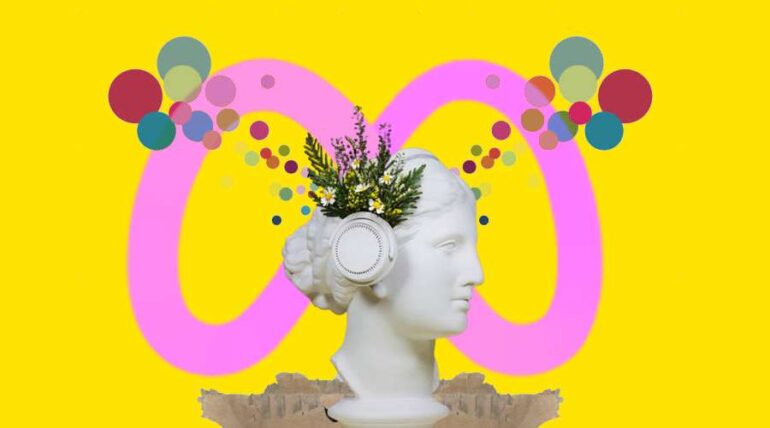TL;DR:
- Meta introduces AudioCraft, a cutting-edge AI framework for audio generation research.
- AudioCraft comprises MusicGen, AudioGen, and EnCodec models.
- MusicGen generates music from textual inputs using licensed data.
- AudioGen transforms text into audio and can be trained with public sound effects.
- EnCodec serves as an AI-powered encoder, quantizer, and decoder.
- Meta enhances EnCodec for superior music generation quality and releases pre-trained AudioGen.
- Researchers gain access to train models with custom datasets, contributing to the forefront of audio innovation.
- AudioGen and MusicGen model cards, along with training code, are made public under MIT license.
- AudioCraft reshapes audio generation through EnCodec’s neural audio codec and autoregressive language model.
- AudioGen redefines AI music generation with self-supervised audio representation
Main AI News:
In a stride toward accelerating the progress of audio generation research, Meta has taken a remarkable step by open-sourcing their revolutionary AI framework, AudioCraft. This landmark development equips researchers and practitioners with the tools they need to propel their models and revolutionize the audio landscape. Comprising three distinctive models—MusicGen, AudioGen, and EnCodec—the AudioCraft framework emerges as an epitome of ingenuity.
MusicGen, the first cornerstone of this ensemble, defies convention by generating music compositions based on textual prompts. Leveraging the potency of Meta-owned and meticulously licensed musical data, MusicGen transcends boundaries to create harmonious melodies from words.
The second pillar, AudioGen, holds the power to transmute text inputs into tangible audio sensations. Amplifying its versatility, AudioGen can be trained on publicly available sound effects, ushering in a new era of auditory creativity and expression.
At the heart of this trinity stands EnCodec—an AI-powered marvel that seamlessly interweaves three critical functions: encoding, quantization, and decoding. This technological tour de force propels AudioCraft to unparalleled heights of sonic finesse.
New horizons are illuminated as Meta introduces an enhanced iteration of the EnCodec decoder, heralding an era of superior music generation devoid of unwanted artifacts. The pre-trained AudioGen model joins this symphony of innovation, adept at crafting lifelike environmental sounds and intricate soundscapes—from the echoing bark of a dog to the melodic chorus of honking cars, even the gentle cadence of footsteps on a wooden floor. The complete arsenal of weights and codes for the AudioCraft model further underscores Meta’s commitment to empowering creators.
Embarking on an unprecedented journey, researchers find themselves at the crossroads of possibility and progress. The veil is lifted, granting access to Meta’s hallowed platform, which, for the first time, welcomes pioneers to train their models with bespoke datasets and contribute to the cutting edge.
Once honed, these models orchestrate a symphony of realism and excellence, translating user-input words into captivating music and immersive soundscapes. MusicGen, AudioGen, and EnCodec—this triad of brilliance forms the bedrock of AudioCraft, forever transforming the realm of auditory creativity.
The inception of AudioCraft ushered in a paradigm shift, and two pillars emerged in 2017—MusicGen and AudioGen. These luminaries in AI music generation enriched the auditory landscape, each rooted in a unique training ethos. MusicGen found its essence in Meta’s proprietary and authorized musical corpus, while AudioGen drew from publicly available sound datasets, redefining audio generation.
Meta’s vision for AudioCraft extends beyond mere innovation—it’s an audio renaissance. Intuitively designed, AudioCraft dons the garb of professionalism, conjuring pristine sounds with unmatched finesse. This new dawn stems from a pioneering approach, meticulously engineered to elevate the audio generation’s state-of-the-art standards.
The very core of AudioCraft’s magic lies in the EnCodec neural audio codec—an alchemical process that extracts profound insights from raw audio data. This treasure trove of insights then fuels an autoregressive language model, an instrument finely tuned with a curated “vocabulary” of musical samples or audio tokens. This linguistic virtuoso, in turn, trains a novel audio language model, unraveling the intricate tapestry of token relationships. These tokens, woven from textual prompts, breathe life into a new narrative, returning to the EnCodec decoder. A symphony of synthesis is thus orchestrated, birthing melodies and sounds that resonate with the soul.
In a realm where tradition met innovation, AudioGen emerges as the harbinger of transformation. The traditional bastions of symbolic music representations—be it MIDI or piano-punched paper rolls—witness a modern evolution. While they’ve stood the test of time in training AI models, the quest for nuance and aesthetics posed challenges. The solution unfolds through a complex ballet, involving the infusion of original music into the system’s veins. Self-supervised audio representation learning and cascaded models dance in harmony, yielding intricate music compositions that capture the essence of longer-range structures. The results are resoundingly promising, although refinement remains a focal point.
Conclusion:
The unveiling of Meta’s AudioCraft marks a transformative leap in the field of audio generation research. By democratizing access to state-of-the-art models such as MusicGen, AudioGen, and EnCodec, Meta empowers researchers and practitioners to shape the future of auditory creativity. With enhanced capabilities and open-source resources, the market can anticipate an influx of innovative applications spanning from professional music production to interactive storytelling experiences. This strategic move positions Meta as a pioneer in driving market evolution, fostering collaborations, and fueling the audio industry’s growth trajectory.

